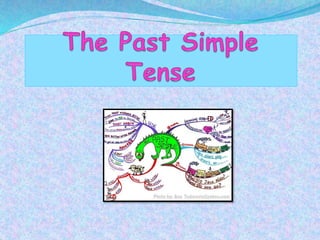
Past simple
- 2. Usage 1. Use the Past Simple to express an action that started and finished at a specific time in the past. Sometimes, the speaker may not actually mention the specific time, but they do have one specific time in mind. Examples: I saw a movie yesterday. Last year, I traveled to Japan. Did you have dinner last night? She washed her car two hours ago.
- 3. 2. We use the Simple Past to list a series of completed actions in the past. These actions happen 1st, 2nd, 3rd, 4th, and so on. Examples: I finished work, walked to the beach, and found a nice place to swim. He arrived from the airport at 8:00, checked into the hotel at 9:00, and met the others at 10:00. Did you add flour, pour in the milk, and then add the eggs?
- 4. 3.The Simple Past can be used with a duration which starts and stops in the past. A duration is a longer action often indicated by expressions such as: for two years, for five minutes, all day, all year, etc. Examples: I lived in Brazil for two years. Ruti studied Japanese for five years. They sat at the beach all day. They did not stay at the party the entire time. We talked on the phone for thirty minutes.
- 5. 4.The Simple Past can also be used to describe a habit which stopped in the past. It can have the same meaning as “used to.” To make it clear that we are talking about a habit, we often add expressions such as: always, often, usually, never, when I was a child, when I was younger, etc. Examples: I studied French when I was a child. He played the violin. He didn't play the piano. Did you play a musical instrument when you were a kid? She worked at the movie theater after school.
- 6. 5. The Simple Past can also be used to describe past facts or generalizations which are no longer true. As in USE 4 above, this use of the Simple Past is quite similar to the expression “used to." Examples: She was shy as a child, but now she is very outgoing. He didn't like tomatoes before. Did you live in Texas when you were a kid? People paid much more to make cell phone calls in the past.
- 8. Form: Verb “to be” • I : I was born in Israel. • he: He was a doctor. • she: She was in the USA. • it: It was cold yesterday was • we: We were at home yesterday. • you: You were right! • they: They were in Italy last summer. were
- 9. Negative Form: Verb ‘to be’ I, he, she, it - was not (wasn’t) • I wasn’t sick last week. • He wasn’t in Eilat last summer. • She wasn’t at school on Monday. we, you, they – were not (weren’t) • We were not at home on Saturday. • You weren’t happy with your grades. • They weren’t angry with his behavior.
- 10. Questions with Verb “to be” Yes / No Question Wh – Non- Subject Question Wh- Subject Question Was Were I, she, he, it we, you, they Rest of the sentence? Rest of the sentence? Who/What was Rest of the sentence? Wh - word was were I, she, he, it we, you, they Rest of the sentence?
- 11. Past Simple: Regular Verbs The Past Simple tense of the most English verbs (regular verbs) is formed by adding "-ed"/"-d" to their base form. (If the verb ends in "-e", we add "-d" to form the past simple) Examples: We arrived at 9:00 o'clock. My brother lived in London four years ago. When she was young, she danced beautifully.
- 12. Spelling Rules If a regular verb ends in consonant + y change y to i and add -ed: carry - carried, study - studied, fry - fried, try - tried If a one syllable regular verb ends in consonant + vowel + consonant double the final consonant and add - ed -- > stop - stopped, plan - planned, rob - robbed, beg - begged If a regular verb has more than one syllable and ends in consonant + vowel + consonant, we double the final consonant only if the final syllable is stressed -- > preFER - preferred, regRET - regretted Exception: In British English verbs ending in -l have -ll before -ed whether the final syllable is stressed or not -- > travel - travelled
- 13. Irregular Verbs There are also some verbs called irregular verbs that have special past tense forms. See list of irregular verbs We went (go) to school yesterday. The children read (read) that story last year. Tamar wrote (write) the letter to her friend on Sunday. The students forgot (forget) to do the homework.
- 14. Negative Form Negatives in the Simple Past are formed by adding didn't (informal) or did not (formal) before the simple form of the verb. The girl didn’t come to school yesterday. The parents didn’t work on Sunday. The baby didn’t drink milk in the morning. Subject did not V1 Rest of the sentence
- 15. Questions Yes / No Question Did Nevo see his grandparents yesterday? Wh – Non – Subject Question Where did you spend your holidays? Wh – Subject Question Who wrote this beautiful poem? Did Who / What Wh - word Rest of the sentenceV1Subject ? Subject V1 Rest of the sentence ? V2 Rest of the sentence ? did
